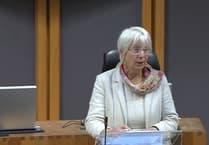FARMING unions have welcomed a new Welsh Agriculture Bill that has been put before the Senedd.
Rural Affairs Minister Lesley Griffiths says the bill will support farmers, sustainable food production, and conserve and enhance the Welsh countryside, culture and language.
The bill also includes the Programme for Government commitment for a complete ban on the use of snares and glue traps. Wales will be the first country in the UK to introduce a complete ban.
Mrs Griffiths said: “This historic Welsh Agriculture Bill not only impacts the agriculture sector, but everyone across Wales, from the food we eat, to how it has been grown, harvested, stored and prepared for sale.
“For the first time, we have the chance to build a system of support and legislation which works for our farmers, our sector, our land and our people.
“These are difficult and challenging times for our farmers. Climate change, rising costs, new trade deals and the war in Ukraine, are just some of the issues they face. This bill provides a framework on which all future agricultural support will be delivered and outlines how we can keep farmers on the land, produce food sustainably and deal with the climate emergency.”
NFU Cymru president Aled Jones said: “For the first time in our history this bill will give Wales the opportunity to implement its own food and farming policy, made in Wales for the people of Wales.
“There is no doubt in my mind that with an enabling policy framework, the £8.5 billion Welsh food and farming sector can continue to grow and thrive thanks to the role Welsh farmers play in producing climate friendly food in an environment and landscape that sees our nature thriving.”
The Farmers’ Union of Wales said the legislation is half way there in providing a stable footing for the future of agriculture in Wales.
FUW president Glyn Roberts said: “Since the Brexit referendum, we have stood our ground and argued for the principles of Sustainable Land Management to be broadened to include the economic sustainability of our family farms, the sustainable production of safe traceable food, Welsh culture and our language which take full account of the Well-being of Future Generations Act goals and other Welsh objectives.
“We are therefore pleased to see that the bill sets out four sustainable land management objectives which include the production of sustainable food and the sustainability of the Welsh language, each of which will be required to contribute to the well-being goals.
“However, we are only half way there with this bill as many of the concerns we raised in our response to the Welsh Government’s Agriculture White Paper in March last year still firmly stand.
“While the list of purposes for which support can be provided is not exhaustive and can be amended, removed and added to, it is concerning that neither the economic well-being of farming businesses nor the Welsh language are explicitly included.
“We must ensure proper remuneration and living conditions for farmers and workers in agriculture and an adequate return on capital investment in the industry are included as defined objectives of the bill. Without such underlying principles, the other objectives of the bill will be undermined or completely negated,” he said.





Comments
This article has no comments yet. Be the first to leave a comment.